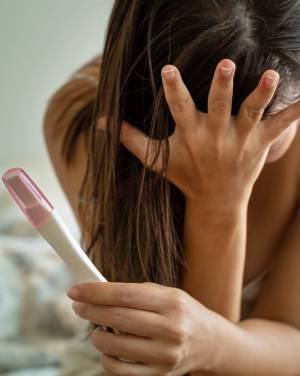Can You Get Pregnant with PCOS or Endometriosis? What If I Have a Surprise Pregnancy?
- Many women of childbearing age hope to conceive despite conditions like PCOS or endometriosis. Often, there are no clear causes or diagnoses when conception does not happen. However, support is available!
- Perhaps you never wanted children or are experiencing a surprise pregnancy despite being considered infertile. Spontaneous conception often happens precisely when couples mentally close that chapter.
- This page focuses on whether and to what extent it is possible to get pregnant despite an infertility diagnosis. It also covers what you can do if you become unexpectedly pregnant despite infertility.
You may like:
- 🤰 Wondering whether you could be pregnant? — Take the Online Pregnancy Test
- ⛑ Unintended Pregnancy? Evaluate your next steps — Quiz
Do you have any questions or concerns? Write your message directly here ⬇️
Am I Infertile?
It is not unusual for couples to be considered infertile. However, there are different types and levels of infertility:
- Untreatable Infertility
5% of all couples who desire children remain childless. In these cases, complete infertility is assumed.
- Fertility Disorder
One in six couples succeeds only with great effort in becoming pregnant. These couples have a fertility disorder. The physical cause lies with either the man’s or the woman’s reproductive system or both.
- Primary Infertility
The term “primary infertility” is used when a woman who has never been pregnant does not conceive within one year of having regular unprotected sexual intercourse.
- Secondary Infertility
The term “secondary infertility” is used when a mother does not conceive again after having at least one successful pregnancy.
Informational Pages Geared to Your Questions:
Possible Causes of Infertility
Supposed infertility can be rooted within the man’s or the woman’s reproductive system. Therefore, it is advisable for both partners to undergo a medical exam if the desired conception does not take place.
Causes of Male Infertility
- There are too few motile and healthy sperm cells (spermatozoa) in the sperm that could manage to reach the egg in the fallopian tube. This is also referred to as “low sperm count.”
- Due to a blockage of the spermatic duct, there are no sperm cells capable of fertilization in the sperm.
Causes of Female Infertility:
- Irregularities in the uterus or cervix due to fibroids (benign tumors) or post-operative scars. This makes the implantation of an egg more difficult or blocks the path of the sperm cells into the fallopian tube (where the egg is waiting for them).
- Hormone imbalances prevent egg cells from maturing or moving into the fallopian tube (ovulation).
- A damaged fallopian tube prevents a fertilized egg from entering the uterus.
- Other causes such as PCO syndrome or endometriosis.
Other Causes
Some couples remain infertile even though no underlying physical causes have been detected. This is a case of unexplained infertility.
How to Get Pregnant When Struggling to Conceive?
Not conceiving as quickly as you had hoped is a colossal endurance test, especially since we often make precise plans when we want to start having children. If you have been trying for more than six months, it might be time for you and your partner to schedule a medical exam to see if there are any physical causes.
You might already know the issue or even have a diagnosis. Nevertheless, it is often possible to become pregnant despite fertility issues. But usually, not until you stop putting pressure on yourself and focus on other aspects of life rather than solely on the desire to conceive.
Of course, there are alternatives, such as adoption or foster care. How do you feel about these thoughts when you cautiously allow them?
If it seems likely that the cause of infertility lies with you, it can be helpful to familiarize yourself with your monthly cycle. A lifestyle characterized by stress and poor nutrition is often a reason for the female body to be out of balance. Even if you have a clear diagnosis like PCOS or endometriosis, it doesn't hurt to examine your cycle more closely to pinpoint a possible fertile window. Researching the Natural Family Planning method (NFP) may also help.
What Are the Chances of Having a PCOS Pregnancy?
Globally, 6.73% of women have been diagnosed with PCOS (polycystic ovary syndrome), a metabolic and hormonal disorder. Research has shown that up to 10% of women of reproductive age carry this diagnosis.
PCO syndrome causes the following disruptions in the female reproductive system:
- Failure to ovulate
- Menstrual disorders
- Irregular or missed periods
According to medical studies, over 75% of women with polycystic ovary syndrome cannot get pregnant without medical intervention because of anovulatory infertility (not ovulating). However, a woman suffering from PCOS should not automatically assume she cannot get pregnant. This is important to note if there is no desire to have children.
On the other hand, women who desire children have the option of long-term medicinal therapy. With patience, you may be able to conceive despite PCOS.
ℹ️ For advice specific to your situation, seek the opinion of a reproductive endocrinologist.
Endometriosis and Pregnancy?
About one in ten women of childbearing age has endometriosis.
This is a condition in which the lining of the uterus also grows outside the uterine cavity, for example, in the ovaries, intestines, or bladder. Since this mucous membrane changes cyclically, painful inflammatory processes occur, which lead to irritating scarring and adhesions. For more information, go to the Endometriosis Association website.
Endometriosis can cause the following changes in the female body:
- Possible prevention of ovulation
- Menstrual disorders
Although endometriosis can lead to infertility, it is not impossible to become pregnant without intervention.
ℹ️ Couples who long for a baby despite endometriosis should note that hormonal treatment of endometriosis often has a contraceptive effect. Therefore, competent supervision by a doctor is necessary.
Polycystic Ovarian Pregnancy — Now What?
Perhaps you have become pregnant despite one of the conditions listed above.
Maybe you had leaned on your doctor's pronouncement of infertility, and it happened anyhow...
If you had assumed you could not get pregnant because of an infertility diagnosis. This kind of news would probably cause you to feel as if your world were crumbling apart. Perhaps it feels like bad timing, you are in a complicated relationship, or you are concerned you might have to raise this child on your own. Many questions are probably going through your mind as you try to discern your next steps.
We would love to walk alongside you every step of the way, providing you with a nonjudgmental setting as you navigate your concerns. Find the path that is just right for you!
Start by taking one of our free quizzes:
- 👥 How can I use my personality to my advantage? Pregnancy Personality Test
- ⚖️ Wondering whether to have an abortion or not? Abortion Test!
- 🍷🚬 Has my consumption hurt the baby? Tox Test
- 🧑⚕️(Suspecting a) pregnancy — How soon to see a doctor? Test
- 🙌 Check out our complete scope of free counseling services!






